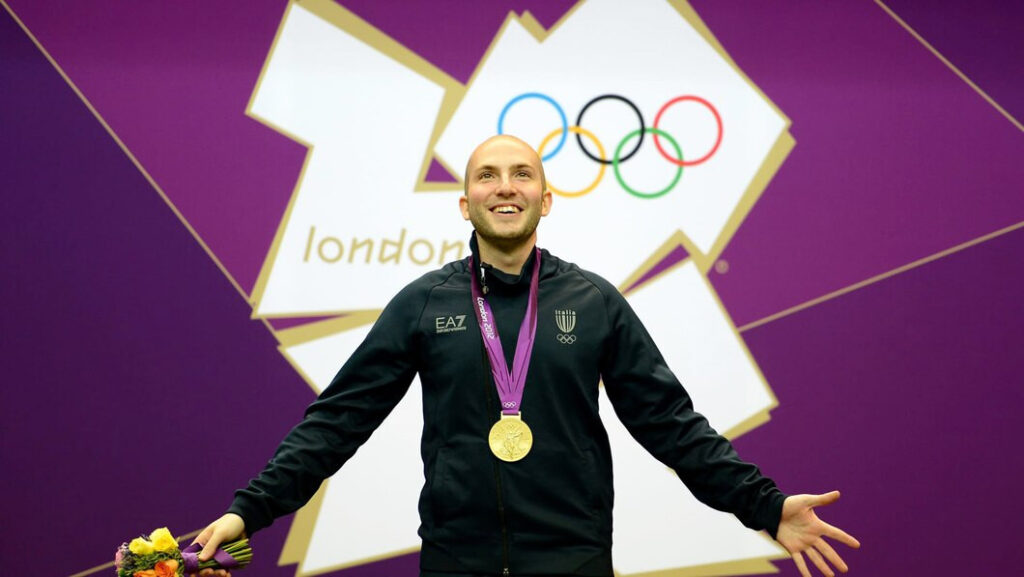
Niccolo Campriani is a great champion of our times. An Olympic legend who won back-to-back golds in London 2012 and Rio 2016, and then went on to make a significant impact on sport as an administrator. His work on the refugee project with India’s own Abhinav Bindra has helped change lives. Now as Sports Director of Los Angeles 2028, Campriani was in Mumbai for the 141st IOC session.
It was a fairly long conversation on Tuesday morning. It lasted more than 30 minutes. And yet, the time just flew. With Nicco, a mind like few others, you are able to dive deep into the deeper meaning of sport. “When you start out, it is all about winning competitions,” he said. “You want to win against your opponents. But then you realise it is you who is your real competitor. You need to be the best version of yourself. Then again, you realise this isn’t the real meaning of sport. You need to be able to make a difference in human lives, far more significant than winning a sports competition. That’s when sport becomes meaningful and tangible. Both Abhinav and I are trying to do so in our own ways. It is a quest to make our world better using the prism of sport and it is a quest that will continue.”
Profound words with a deeper meaning. Wearing his hat as Sports Director LA, he was closely involved with the process of presenting before the IOC the recommendations of LA 28 for the inclusion of new sports in the Olympic programme. And one of them was cricket. Cricket’s return to the Olympic fold has been much talked about in India and beyond, and Nicco’s comment about “My friend Virat” went viral. As part of the conversation, he explained the context behind that tongue-in-cheek comment and looked at the rather funny side of it while explaining the cricket story in detail.
Boria: You have given me a lead by mentioning the word that all of India wants Niccolò Campriani to talk about. More after your comment at the IOC session where you said, “My friend Virat Kohli with 300 million-plus social media followers”. Just tell me a little bit about, you know, what you meant by that? I mean, a combination of so many factors has brought cricket back to the Olympic fold. Obviously, Virat is a huge icon. But when you included cricket, it is a fascinating story and a great marketing story as well. Your thoughts about it?
Campriani: Yes, just the fact that that sentence went viral is a great testimony to the power of cricket. I mean, it really went viral. It was kind of funny because, yeah, just to be clear… I mean, I am sure he is a lovely person, but I am not a close friend of Virat Kohli. It was just a way to bring it up into the conversation (smiles). And I apologise if I was misleading in that. But look, it is really mind-blowing to talk about cricket and present cricket here in India. Like we could feel that excitement the moment we walked outside that room. We are thrilled to welcome, you know, the world’s second-most popular sport. The facts are facts. You know, this estimated number of 2.5 billion fans worldwide is going to be a game-changer for the LA 28 games, but also for the whole Olympic movement. And there were, you know, a few questions also from the members like, OK, but, you know, why in LA? Why not wait until, you know, next games in Brisbane? More because Australia is one of the strong countries in cricket.
And in the end, people do not realise how important the growth story of cricket is in the US. And truly, it has already started. It has already started with the MLC, with the Major League Cricket. And people will realise it more and more now with the T20 World Cup coming next year, next summer in the US in iconic locations in the country. So it is going to be a unique platform to boost this process. And it was important to say that cricket really played a strategic role when it comes to the package. As you can see, there are some traditional American sports like flag football, the contact-free version of American football, as well as lacrosse, as well as baseball, and softball. So, it was important to propose a package that was balanced in that sense. And I think that narrative, which is, I think, in the end, very clear about showcasing American sports to the world and introducing global sports to the US. That is really what we wanted to send as a message.
But yeah, I thought it was funny that it truly went viral. So, I reached out to Abhinav in case he knew Virat, which, by the way, he does. And it was like, OK, so say sorry for me. I did not mean it. But if anything, you know, it is a great testimony to what cricket is in India. And yeah, it is truly mind-blowing.
Boria: I mean, if that comment spurs Virat on to play till LA 28 and represent India and try and wear that Olympic medal around his neck, each one of us will go and thank you saying we appreciate very much you doing this. So, no need of an apology at all!
Also, you mention financial sustainability. For a sport like cricket, how important a consideration was that when you chose it? Because clearly this market, the Global South, and the Indian market, bring in a lot of this financially sustainable point. I mean, it is a massive cricket market. Also in the US, the Indian diaspora, for example, how important is that as a consideration, if at all, for any project?
Campriani: It was not just important for cricket. It was important for the entire package. You know, while we want to put together absolutely the most compelling program ever, we have a steadfast commitment to do that in a financially sustainable way. And we breathe the financial responsibility every single day. When it comes to a new sports proposal, that was absolutely one of the key considerations and a bit of a north star. So, it was important for us to know that every single new sport that we would include would be financially sustainable, meaning that we would be looking at existing venues. And I am talking about world-class venues.
In LA and in the United States, we will continue to stay true to our philosophy of no-build games. So, no new permanent venues were built for the games. We have an incredible opportunity here to see how major league cricket, as well as the T20 World Cup, will further grow cricket in the US. And see if there is an opportunity to leverage and create a synergy in that, like the venues that will be built as part of the major league cricket and the six franchises that are currently competing in the major league cricket. So, piggyback on that. I think for us as organisers, you are really looking at operating costs. But then, you have also the broader consideration as an Olympic movement of what bringing cricket means. But I think for us, it is important to make sure that financial sustainability is there in everything we do. It was not about bringing a new sport at all costs, not at all. So that was absolutely a key consideration, not just for cricket, but for the whole package.




